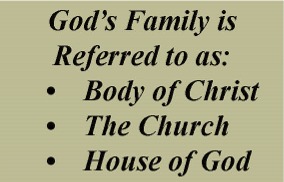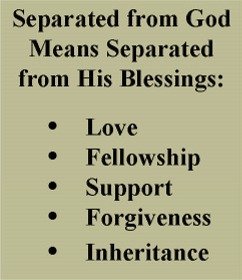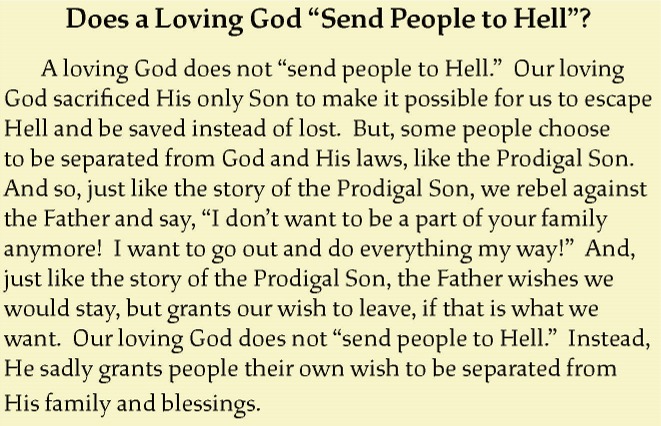Welcome to Lesson 5. After you finish reading the lesson, please scroll down to complete and submit the quiz. Your quiz will be graded by a member of the church who will then email the results to you. Thank you for allowing us to study the Bible with you.
Sin
In this lesson we will talk about sin that separates man from God. This topic is important to understand because if we do not resolve our sin problem we cannot be in God’s presence, including after this life in Heaven.
What is Sin?
Since God is the Creator, He determines what is right or wrong. That which is “right” is that which God approves of and is in accordance with the purpose He had for creating us. That which is “wrong” goes against what God approves of and what He has in mind for His purpose for us. God determines what is “good,” and what is “evil.”
God has spoken to us in His word, the Bible, and there, He defines what “sin” is. “Whosoever committeth sin transgresseth also the law: for sin is the transgression of the law.” (1 John 3:4) We sin when we “transgress” the law of God. To “transgress” something means “to go beyond,” or “to step across.”
God gives us laws to follow so that we know what He approves of (good), and what He does not approve of (evil). When we “transgress,” or “go beyond,” the line that the law lays down, then we sin. Therefore, sin is going beyond what God’s law says and stepping over the “good” line into the “evil” line.
Who Sins?
In order to be held accountable for breaking a law, you have to be able to understand the law. Many societies would not arrest a two-year old for jaywalking if he wandered out into the street. Why? Because we know that the child was too young to understand they were violating a law. Similarly, societies may not prosecute an adult for a crime if it could be determined that the murderer was not mentally capable of understanding what they were doing.
God is a just God. He is capable of delivering perfect justice to us without prejudice. “Then Peter opened his mouth, and said, Of a truth I perceive that God is no respecter of persons: But in every nation he that feareth him, and worketh righteousness, is accepted with him.” (Acts 10:34-35) Therefore, God will not condemn someone for disobeying something they were incapable of understanding.
Those that sin are those who are old enough and mentally capable enough to be able to understand the laws of God. Not everyone old enough and mentally capable enough know the laws of God. That is why we teach people. People need to know God’s laws so they can obey them and be found pleasing to Him.
So, how many of those that are old enough and mentally capable enough of understanding God’s laws have sinned? Everyone. “For all have sinned, and come short of the glory of God;” (Romans 3:23) The idea of “coming short” is like the one who throws his dart at the target and misses the center. He may have tried to hit the center, but his dart came up short. In other words, he crossed the line out of the good part into the part that was not good.

Results of Sin
It’s not hard to see that breaking the law has consequences. Just go to a jail or prison and you will see people that went beyond the law and are now being punished for it.
The results of sin are no different. All we have to do is look to the historical record of the Bible and we will see people suffering the consequences of their sin.
Adam and Eve were the first man and woman and they sinned. They were in a garden and had what they needed. However, they were told not to eat from a certain tree. (Genesis 3:2-3) But, Adam and Eve chose to disobey God and go beyond His law. “And when the woman saw that the tree was good for food, and that it was pleasant to the eyes, and a tree to be desired to make one wise, she took of the fruit thereof, and did eat, and gave also unto her husband with her; and he did eat.” (Genesis 3:6) Since sin is a transgression of the law, and they went beyond the law, they sinned.
God had told them that the consequences of that sin would be death. The word “death” simply means “a separation.” In physical death, the soul separates from the physical body. “For as the body without the spirit is dead, so faith without works is dead also.” (James 2:26) In spiritual death, it means a separation from God. Since God is holy and perfect, He cannot have sin in His presence. “Behold, the LORD’S hand is not shortened, that it cannot save; neither his ear heavy, that it cannot hear: But your iniquities have separated between you and your God, and your sins have hid his face from you, that he will not hear.” (Isaiah 59:1-2) The word “iniquities” is another word for “sins.” It really means “lawlessness.” When you don’t obey the laws, you are “lawless” or an “outlaw.” When we go beyond God’s laws and sin, we are ignoring God’s laws, which makes us “lawless.” God does not desire to be separated from us, but when we practice iniquity, we spiritually die and are separated from Him.
Adam and Eve were separated from God and had to leave the perfect garden. Before, they were with God and living forever. But then, when they chose to disobey God, they began to physically die, and they also became spiritually dead and separated from God.

Death is still the consequence of sin today. “For the wages of sin is death; but the gift of God is eternal life through Jesus Christ our Lord.” (Romans 6:23) When we sin, we become spiritually dead and separated from God, unable to return to His presence. As we shall see later, Jesus made it possible to gain back life and return to the presence of God. Notice the last part of the verse. “...but the gift of God is eternal life through Jesus Christ our Lord.” (Romans 6:23)
Not only are there spiritual consequences to sin, but there can also be physical ones. Adam and Eve began to physically die after they sinned. Death entered the world. “Wherefore, as by one man sin entered into the world, and death by sin; and so death passed upon all men, for that all have sinned:” (Romans 5:12) We have physical consequences of sinning as well. Committing sexual sin might cause you to contract a deadly disease. Stealing from your place of work might cause you to get fired.
What it Means to be “Lost”
Even though the physical consequences of sinning can be unpleasant, the spiritual consequences of sinning are worse. Why? Because the physical consequences are temporary and the spiritual consequences can be permanent. Even if you go to prison, it is for a limited time. Even if you die in prison, the physical punishment is over. But, if you physically die while you are spiritually dead, you will remain separated from God forever.
Being separated from God is what we would call being “lost.” It means that you are not a member of His family. You have chosen to rebel against God’s commandments and the consequences are that you are separated from God. Perhaps you have heard of the characters known as “the lost boys” from the play and novel, Peter Pan; or, the Boy Who Wouldn’t Grow Up, by the author J.M. Barrie. In that story, some babies fell out of their carriages, or prams, and were not claimed by their parents. They were without a family. They became the “lost boys.”

The story of the Prodigal Son, or a lost boy, in the Bible (Luke 15:11-32) is an analogy of the plight of man. In the story, the son rebels against his father’s way of life, takes his portion of his inheritance and goes and wastes it. He then finds himself alone and starving and without his family. He is lost. He then decides to go and apologize to the Father and ask if he could just be a servant in his father’s house. Once he repents, apologizes, and says he wants to live according to his father’s rule of the house, the father shows him great mercy. The father welcomes him back with open arms and holds a celebration. When talking to the other son who did not leave, the father states, “It was meet that we should make merry, and be glad: for this thy brother was dead, and is alive again; and was lost, and is found.” (Luke 15:32) Just as the prodigal son was lost because he rebelled against his father’s house and wanted to live his own way, man is lost when he rebels against God’s rules and decides to go beyond God’s laws and live his own way. We, too, need to realize we were wrong in rebelling against God, the Father, and repent to turn back and offer to be a servant in His house. God will welcome us back with open arms and not only make us a servant, but put us back in the family!
But, what does it really mean to “be lost”? What are the real consequences of being separated from God?
Being away from God means being separated from His blessings. God loves us and blesses us richly. But, if we disobey and separate ourselves from His family, we lose blessings.
“Blessed be the God and Father of our Lord Jesus Christ, who hath blessed us with all spiritual blessings in heavenly places in Christ:” (Ephesians 1:3) Paul states that all the spiritual blessings are “in Christ.” He means that we have spiritual blessings, but only if we are in the body of Christ. The “body of Christ” is another name for God’s church. In referencing Jesus, Paul wrote “And hath put all things under his feet, and gave him to be the head over all things to the church, Which is his body, the fulness of him that filleth all in all.” (Ephesians 1:22-23)

Paul stated that the church was also the house of God. “But if I tarry long, that thou mayest know how thou oughtest to behave thyself in the house of God, which is the church of the living God, the pillar and ground of the truth.” (1 Timothy 3:15) Someone’s house is another way of saying someone’s family. Joshua said, “And if it seem evil unto you to serve the LORD, choose you this day whom ye will serve; whether the gods which your fathers served that were on the other side of the flood, or the gods of the Amorites, in whose land ye dwell: but as for me and my house, we will serve the LORD.” (Joshua 24:15) Joshua’s physical house would not serve the Lord. He meant everyone in his family would serve the Lord. To have spiritual blessings, we need to be in Christ, God’s church, His house, His family.
What are the spiritual blessings we would get by being in God’s family? Think of what blessings you would get by being in a good, physical family. You would get love, fellowship, support, forgiveness, and possibly an inheritance. The same is true for the spiritual family of God. “In Christ” you will have love, fellowship, support, and a spiritual inheritance. Jesus wants those in His family to have love. “By this shall all men know that ye are my disciples, if ye have love one to another.” (John 13:35) Jesus wants those in His family to have fellowship and forgiveness. “But if we walk in the light, as he is in the light, we have fellowship one with another, and the blood of Jesus Christ his Son cleanseth us from all sin.” (1 John 1:7) Jesus wants those in His family to have support. “Bear ye one another’s burdens, and so fulfil the law of Christ.” (Galatians 6:2) Jesus wants those in His family to have an inheritance of eternal life in Heaven, like He has. “The Spirit itself beareth witness with our spirit, that we are the children of God: And if children, then heirs; heirs of God, and joint-heirs with Christ; if so be that we suffer with him, that we may be also glorified together.” (Romans 8:16-17)

Now we can see why the spiritual consequences of sin are worse than the physical ones. Any physical consequence is temporary and only lasts while you are alive on earth. Spiritual consequences can impact you for eternity.
One spiritual consequence of sin is that you are separated from God’s family and lose out on His inheritance, which is eternal life in Heaven. Unless you wash away your sins, you are separated from God now and you will remain separated from God for eternity. The location set aside for those separated from God for eternity is Hell. Those who do not obey God’s laws, but instead practice “iniquity” or “lawlessness,” will be separated from God. “Not every one that saith unto me, Lord, Lord, shall enter into the kingdom of heaven; but he that doeth the will of my Father which is in heaven. Many will say to me in that day, Lord, Lord, have we not prophesied in thy name? and in thy name have cast out devils? and in thy name done many wonderful works? And then will I profess unto them, I never knew you: depart from me, ye that work iniquity.” (Matthew 7:21-23) Notice that even the ones who think they are following Christ will be told to depart from Him if what they do is not in accordance to the will of the Father. We know what the will of the Father is because He communicated it to us in His word, the Bible. Where will those who are told to depart and be separated from Christ go? Into an eternal Hell. “Then shall he say also unto them on the left hand, Depart from me, ye cursed, into everlasting fire, prepared for the devil and his angels:” (Matthew 25:41)
Hell will be horrible because it will be a place of torment and a place where you will be separated from the love, fellowship, and inheritance of God. There will also be no hope of getting out, because it is an eternal punishment.
On the other hand, Heaven is a wonderful place. In describing Heaven, John said, “And God shall wipe away all tears from their eyes; and there shall be no more death, neither sorrow, nor crying, neither shall there be any more pain: for the former things are passed away.” (Revelation 21:4)
The good news is that, just like the father in the story of the Prodigal Son, our Heavenly Father is merciful and wants us to return. He does not want us to stay lost and separated from Him and His blessings. God created Adam perfectly, but when man sinned, God lost a perfect man. Since we all have sinned, we cannot restore a perfect man to God. But, God sent His Son Jesus to live as a perfect man and to die as a perfect sacrifice to God for us. If we accept that payment on our behalf, by obeying God’s plan of salvation, we wash away our sins and are added to the church, His family. Those who obeyed God’s word on the Day of Pentecost were added by God to the church. “Praising God, and having favour with all the people. And the Lord added to the church daily such as should be saved.” (Acts 2:47)
- Hear the good news about Jesus - Romans 10:13-14
- Believe Jesus is the Son of God - John 3:16
- Repent from sin and turn to obey God - Luke 13:3
- Confess Jesus is the Son of God - Matthew 10:32
- Be baptized to wash away your sins - Mark 16:16
- Live faithfully serving Jesus - Revelation 2:10

Do We Inherit Sin?
We can choose to rebel against God’s commandments and be separated from His family because God gave us freewill. Freewill is the ability to choose what to do. God created us, loves us, and wants us to love Him in return. The only way we can really love Him is if He gave us the freewill to choose to love Him. We make decisions for ourselves, including a bad one to leave a good family, like the Prodigal Son.
We Have Freewill
Some argue that we don’t have freewill because they think the idea of human freewill violates the sovereignty of God. “Sovereignty” refers to supreme authority. The argument states that if humans have freewill to choose, then that means God does not have supreme authority. Therefore, they conclude that God is supreme and anything we do is because God made us do it.
It is true that God has supreme authority. We can see that in the Bible. “And all the inhabitants of the earth are reputed as nothing: and he doeth according to his will in the army of heaven, and among the inhabitants of the earth: and none can stay his hand, or say unto him, What doest thou?” (Daniel 4:35)
However, just because a being has supreme authority does not mean that he or she can’t give a choice to someone else. Adonijah tried to make himself king, even though King David had said that Solomon would become the new king. Once King David had Solomon anointed and set up as the new king, Adonijah was in trouble and feared for his life. He did not want to be killed for trying to take over the throne. But the new king, Solomon, gave him a choice. “And Solomon said, If he will shew himself a worthy man, there shall not an hair of him fall to the earth: but if wickedness shall be found in him, he shall die.” (1 Kings 1:52) Did Solomon have all authority as king? Yes. Did that stop him from giving Adonijah a choice? No. Adonijah was fearful for his life, but Solomon basically said, “Be good, and you will live. Be bad, and you will die.” Sound familiar? It’s the same dilemma man finds himself in. We have rebelled against the King of Heaven and found ourselves worthy of death. But, the merciful King says, “If you will repent and be good and obey me, you may live. If you choose to be bad and go against my laws, you will die and be separated from me.”

Our choice in no way negates the supreme authority that a king or God has. A king is supreme in authority, but that does not stop him from giving a choice to his subject.
Another problem with this idea is that it makes God responsible for sin. If God is supreme in authority, which He is, but that means we do not have freewill, then that means God makes all our decisions for us. If God makes all our decisions for us, then it is His fault that we rebel against His commandments and sin, it is His fault we are spiritually dead and separated from Him, and it is His fault that He will condemn us to an eternal Hell. That is not the just God of the Bible. A just God would not condemn us to Hell for disobeying His laws when He forced us to disobey.
We have freewill and we have a choice. As we saw earlier in the Bible, Joshua said people had a choice. “And if it seem evil unto you to serve the LORD, choose you this day whom ye will serve; whether the gods which your fathers served that were on the other side of the flood, or the gods of the Amorites, in whose land ye dwell: but as for me and my house, we will serve the LORD.” (Joshua 24:15) Stating that my punishment for sin is someone else’s fault is a very immature attitude, because I am not taking responsibility for my own actions.
Can I Inherit Sin?
But, even though it is possible for me to sin and have consequences from it, is it possible I could also inherit the sin of someone else? Some people believe it is possible to not only sin, but also receive the consequences of someone else’s sins. One idea is that we receive the sin of Adam through inheritance. This is the idea of “original sin.” The idea states that Adam and Eve carried out the first sin and everyone else inherits it.
What we are really talking about is the idea of “imputation.” The idea of “imputation” states that someone’s righteousness or evil can be put on an account. The question is, will righteousness or evil be put on my account because I put it there, or will it be there because someone else put it there? What does God say about imputation? God is a just God. He will perfectly give out blessings to those who obey Him and punishment to those who don’t. What does He tell us in the Bible about imputation?
The Bible clearly states that imputation does occur, but not like “original sin.” The Bible teaches that imputation puts either righteousness (following God’s laws) or sin (not following God’s laws) upon your account, but it is solely based upon what you choose to do. Imputation, according to the Bible, says that you do not get righteousness or sin put onto your account based on someone else’s actions, including the actions of Jesus the Christ.
Let’s look at some Bible examples about imputation. The first is about Abraham. “He staggered not at the promise of God through unbelief; but was strong in faith, giving glory to God; And being fully persuaded that, what he had promised, he was able also to perform. And therefore it was imputed to him for righteousness.” (Romans 4:20-22) Abraham had a good imputation. He received righteousness on his account. Why? Because, he believe God and obeyed God.
Now, let’s look at a different imputation. God said, “What man soever there be of the house of Israel, that killeth an ox, or lamb, or goat, in the camp, or that killeth it out of the camp, And bringeth it not unto the door of the tabernacle of the congregation, to offer an offering unto the LORD before the tabernacle of the LORD; blood shall be imputed unto that man; he hath shed blood; and that man shall be cut off from among his people:” (Leviticus 17:3-4) In the Mosaical dispensation, if someone did not follow the laws of God by bringing a slain animal to make an offering, then blood shall be “imputed unto that man.” This was a bad thing, and the punishment was “a separation.” He would be “cut off from among his people.” Why did Abraham get a good imputation on his account? Because he believed and obeyed God. Why would someone get a bad imputation? Because they did not obey God.
There is such a thing as imputation according to God, but God makes it clear that the responsibility falls upon the shoulders of the individual. “The soul that sinneth, it shall die. The son shall not bear the iniquity of the father, neither shall the father bear the iniquity of the son: the righteousness of the righteous shall be upon him, and the wickedness of the wicked shall be upon him.” (Ezekiel 18:20) If I sin, it is because I choose to sin, not because someone else sinned or because God made me sin. If I sin, then I bear the spiritual consequences of that sin. I do not have to bear the spiritual consequences of the sins of other people, and other people do not have to bear the spiritual consequences of my sin.
It is true that I might have to suffer the physical consequences of the sins of others. A drunk driver may crash into a loved one and take them from me. In that case, someone else made a sinful choice and I suffered the consequences from it. However, when it comes to spiritual consequences, God makes it clear that if there is righteousness on my account it will be because I put it there, and if there is sin on my account it will be because I put it there.
The idea that we receive righteousness or sin on our account based on what someone else did is false. The imputation we receive will be based upon the deeds we have done, not the deeds of someone else.
False Views on Imputation
Infant Baptism
Remember, we learned that someone is not held accountable for breaking the law, including God’s law, if they were too young to understand it. Newborn babies cannot understand God’s law, nor can they understand God’s plan of salvation to overcome sin. So, why do some people think babies need to be baptized to be forgiven? Because, some people incorrectly think the baby was born with the sin of Adam. “The son shall not bear the iniquity of the father,” (Ezekiel 18:20).

Mankind’s Sin Was Imputed Onto Christ
This idea is that all the sins of the world were imputed to Jesus on the cross, and He became the worst sinner ever.
This contradicts the Bible’s teachings that Jesus was a perfect sacrifice. If Jesus became a sinner because He had our sin imputed onto Him, He is no longer a perfect man, and therefore He is not a perfect sacrifice. If that is true, we have no payment for our sins and we are all lost. When Jesus was offered to God, He was a sacrifice “without spot,” meaning He had no sins. “How much more shall the blood of Christ, who through the eternal Spirit offered himself without spot to God, purge your conscience from dead works to serve the living God?” (Hebrews 9:14)
This incorrect idea may also stem from a misunderstanding of a Bible verse. “For he hath made him to be sin for us, who knew no sin; that we might be made the righteousness of God in him.” (2 Corinthians 5:21) Jesus being made to “be sin” for us does not mean He literally became sin. Instead, it is a figure of speech known as “Metonymy of the Cause.” This is where the cause is stated, but what is really meant is the effect. Hosea said, “They eat up the sin of my people, and they set their heart on their iniquity.” (Hosea 4:8) People were not really eating sin, but they were eating the animals that were part of the sin offering. Therefore, Hosea said the people were eating sin (the cause) but what he really meant was the people were eating the sin offering (the effect). Similarly, Paul is writing that Jesus is made “to be sin for us.” While Paul states the cause (sin), what he really says is that Jesus is made to be the effect (our sin offering). Jesus was not sin and had no sin, but He was made to be a sin offering.
Saved By Grace Only
Some believe there is no way we can be righteous in the sight of God because they think we are born evil and have “original sin.” Also, if one believes we do not have freewill because God’s authority will not allow it, which is false, then we could not be righteous even if we wanted to be. Therefore, some may say that God’s grace allows the righteousness of Jesus to be “draped over you.” That means you are not really righteous, but you just appear to be righteous because you have the righteousness of Jesus imputed to you and draped over you.
But, as we have seen, the imputation we see in the Bible says that you are righteous when you choose to be righteous. “Little children, let no man deceive you: he that doeth righteousness is righteous, even as he is righteous.” (1 John 3:7) “Righteousness” is defined as the commandments of God. “My tongue shall speak of thy word: for all thy commandments are righteousness.” (Psalm 119:172) Therefore, when we obey God’s commandments (righteousness), we become righteous, and then we have righteousness imputed on our account.
Yes, God’s grace sent His Son to be a perfect sacrifice for our sins. But, just because it is a gift does not mean that we automatically receive it. God gave us freewill and does not automatically force us to repent and return to Him to receive salvation. We must choose salvation!
NOTE: This lesson was written and developed by Truth for the World and is used here by permission.

Time's up